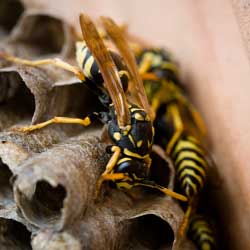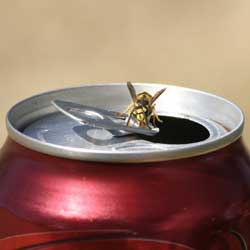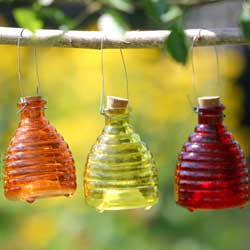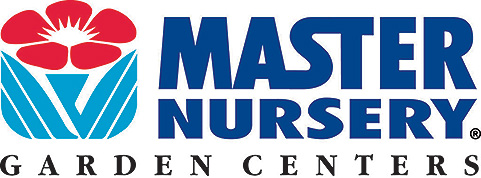Sometimes it’s difficult to tell good versus bad. Take the “yellowjacket” for an interesting example. When you hear “yellow jackets,” what do you picture? A buzzing wasp ruining your outdoor meal or a predator of garden pests and pollinator of many plants?
To be honest, a yellowjacket is both!
The most commonly found yellowjackets in Contra Costa County include the German and Western Yellowjackets. Both are approximately 3/4″ long with alternating yellow and dark brown bands around their shiny bodies. They do not have any “hairs” such as found on honeybees and bumblebees.
During the spring and summer, the colony population increases from the solitary queen, who survived the winter, to several thousand. The adult yellowjackets feed protein to the young wasps and larvae while they subsist on sugars. Foraging for food, the wasps cross-pollinate plants while seeking small insects and nectar. This is when the wasp and human conflicts occur.
Yellowjackets, drawn to cookouts, picnic areas and garbage cans for food, create a nuisance. Unfortunately, their stings are especially painful. Unlike honeybees, which only sting once, wasps sting numerous times. Some people react severely to the venom and may have problems breathing or worse.
Here are some ways to reduce the possibility of inviting yellowjackets to your outdoor party:
- Don’t leave moist pet food outside during the summer. (Bird seed is fine, not suet)
- Keep garbage cans washed. Securely cover all garbage cans and recycling containers. Rinse beer, wine, soft drink and ice cream containers.
- Keep garbage cans away from entertainment areas.
- If eating outdoors, cover all serving plates and drinking glasses/bottles to prevent yellowjacket from getting into food or drink. When yellowjackets are in the area, be sure to check your food and drink before consuming.
- Yellowjackets feed on aphids and scale on trees and shrubs. Therefore, spray for these pests in July and August, if needed.
- Repair dripping hoses and faucets as the puddles attract the wasps.
- Wasps enjoy rotting fruit. Harvest tree and cane fruits when ripe. Carefully pick up all fallen fruit (gloves are a good idea!).
- Wasps create a flight-path from the nest to food sources. Avoid this area. If this is not possible, consider removing the nest.
Traps
Garden centers sell yellowjacket traps. Hang these around the perimeter of your yard if you plan to eat outside and don’t want to invite the wasps. Never hang these near the food area, as you will be attracting the wasps. Some traps are disposable and have the benefit of reducing the sting possibility. Others are “reusable” and must be emptied and refilled with bait. These increase the sting possibility.
It is possible to make your own yellowjacket traps. One simple way is to hang a chunk of fish or meat from a tree branch 12-24″ above a bucket of soapy water. When the yellowjacket takes a chunk, it may fall into the water and drown.
Elimination
Eliminating a nest should not be undertaken lightly. If it’s early in the season, and the nest is visible, a forceful water blast will break it apart. To reduce the chances of being stung, do this in the evening when temperatures are cooler. Sometimes the workers will begin rebuilding in the same place. Your garden center sells pesticide sprays to kill wasps. If it’s later in the season, the aerial nest may be too large to eliminate safely.
Underground nests create a much larger challenge. Because the entrance may be at an angle to the nest, flooding seldom works. Also, do NOT try to “burn them out” by pouring kerosene or other flammable liquid into the entrance to light it. In addition to many stings, injuries that are more serious may occur. This also pollutes the soil.
If the flight pattern to the entrance creates a serious hardship or is close to a building, it is best to consult with an expert.
NOTE: In Contra Costa County, if you have an underground nesting colony, contact the Contra Costa Mosquito and Vector Control District at (925) 771-6172 and they will treat the nest with pesticides to eliminate it.
Some yellowjackets build their colonies within a house wall or attic. Contact a professional for this situation. Remember, do not plug the entrance/exit hole or they may chew the rest of the way into your home! Check with Western Garden Nursery or search “Pest Control” for your city on the internet or in the yellow pages.





